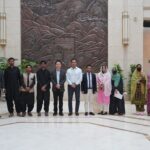Erdoğan visit to Kazakhstan: Turkey will reach China through Kazakhstan while Astana will enter Middle East through Ankara
By Agha Iqrar Haroon
The first official visit of Turkish President Recep Tayyip Erdoğan to Kazakhstan is being considered as successful by Turkish as well as Kazakh media as both countries have decided to work closely in international diplomacy while signing a number of pacts for further cooperation in defence, foreign affairs and trade.
Turkey and Kazakhstan have strong bilateral relations since the independence of Kazakhstan and Turkey was the first country to recognize the independence of Kazakhstan, and it established full diplomatic relations with Kazakhstan after the latter won its independence from the Soviet Union in December 1991. Furthermore, Ankara was the first capital to be appointed with a Kazakh ambassador after Kazakhstan gained independence. Turkey and Kazakhstan have special visa regime and national carriers (Airlines) of both countries provide daily connectivity with all important cities of both countries.
Now a new era of diplomatic relation has begun after Erdoğan’s visit because strategic partnership between the two countries is taking a new dimension. Turkey has promised support temporary membership for Kazakhstan in the United Nations Security Council for 2017-2018 term while Kazakhstan will pave the way for Turkey to access China, South and Southeast Asia and Turkey will help Astana to access the Europe and the Middle East.
Erdoğan and Nazarbayev attended the second meeting of the Turkey and Kazakhstan High Level Strategic Cooperation Council (SCC). The SCC was established in 2012 and Nazarbayev attended its first meeting during his visit Turkey in October 2012.
Astana hosted Kazakh-Turkish Business Forum during the visit of President Erdoğan. This Forum aims to broaden and deepen the level of economic collaboration between the two countries. A group of Turkish businessmen was also accompanying the Turkish President. Turkish businessmen have invested strongly in Kazakhstan and more than 1,800 Turkish companies are operating in Kazakhstan. The total cost of projects implemented by Turkish contractors in Kazakhstan is about $17.5 billion.
President Erdoğan came with a group of his senior ministers including Foreign Minister Mevlüt Çavuşoğlu, Energy Minister Taner Yıldız, Food, Agriculture and Livestock Minister Mehdi Eker, Culture and Tourism Minister Ömer Çelik, National Defense Minister İsmet Yılmaz, Transportation, Maritime and Communication Minister Feridun Bilgin, and Economy Minister Nihat Zeybelçi.
The visit of Turkish President Erdoğan can open a new phase in Turkish- Kazakh relations and re-election of Nazarbayev in April 26 Presidential election can enhance foreign relations between the two countries because Turkey and Kazakhstan relations can be analyzed based on leader-to-leader relations instead of Country to Country relations because Nazarvayev had cordial relations with Turkish presidents in past including Özal, Demirel, Sezer, and Gül, and this trend is expected to continue with President Erdoğan. It is predicted that Turkey-Kazakhstan relations will be strengthen furthered by these two strong and charismatic leaders.

During his visit, Erdoğan indicated that Turkey and Kazakhstan intend to increase bilateral trade turnover up to $10 billion and both countries are working to implement joint economic projects in other Central Asian countries.
Erdogan indicated that a number of political issues was discussed during his meeting with Kazakh President Nursultan Nazarbayev, among which were the crises in Syria, Iraq, Yemen, and the political crisis in Ukraine. Ankara and Astana come out with a unified position on the settlement of military conflicts, according to the president.
Over the last three years, the trade turnover between the two countries has doubled – from $2 billion to $4 billion, and this figure is projected to reach $10 billion within the framework of the program New Synergy, adopted by the heads of the two states. According to Nazarbayev, these funds will allow Turkey to access China, South and Southeast Asia through Kazakhstan. Kazakhstan, in turn, will be able to access the markets of Europe and the Middle East through Turkey.
The three-day visit to Astana and Turkestan during April 15 to 17 by NATO member Turkish President to Astana is being considered as a significant geopolitical development because Astana has strong historic relations with Iran and Russia while Turkey is diplomatic enemy Iran and adverse relations with Moscow over Russian support to Syria. Turkey has emerged as the focal NATO negotiator dealing with Muslim world during the last 3 years and moderate promoter of extremist Wahabi Islam in central Asia by investing in religious schools, building mosques and providing religious teachers to Kazakhstan who have qualified from Saudi Arabia in theology and Islamic jurisprudence.
The Turkish Religious Affairs Foundation (TDV) has restored a number of mosques including Micurin, Tolgar, Nikolayevka and Almaty Central mosques and had provided $2.8 million in financial aid for students from the Faculty of Theology at the University of Foreign Languages and Business Career in Almaty during 2006 to 2014. Moreover, 36 Kazakh students – including 26 high school students, eight undergraduates and two graduate students – are being educated in Turkey by TDV scholarships, while 20 students from the University of Foreign Languages and Business Career are continuing their undergraduate studies at Sakarya University.
During his visit to Turkestan Turkish President Erdoğan attended the opening ceremony of Hoja Ahmet Yessevi Mosque constructed by TDV.





